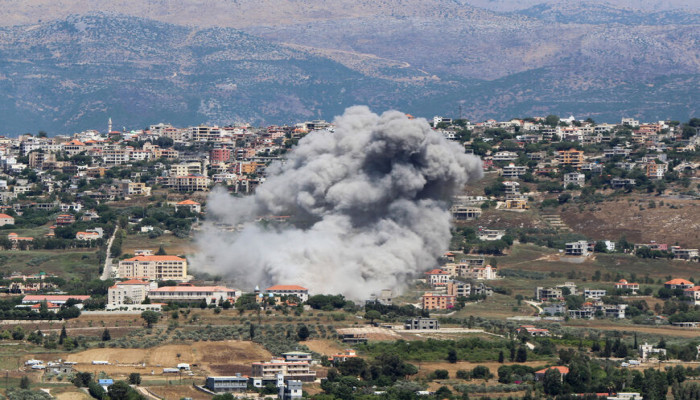India warns nationals against travel to Lebanon amid fears of war with Israel
- In Reports
- 12:00 PM, Jul 29, 2024
- Myind Staff
Seven countries urged their nationals to leave Lebanon while five countries warned their citizens to refrain from travelling to Lebanon amid fears of a full-blown war between Israel and Hezbollah.
On Friday, India and Jordan joined the list of countries issuing travel warnings for Lebanon, as confrontations between the Israeli army and Hezbollah threaten to escalate into a full-scale war.
India’s embassy in Beirut advised its citizens on Friday to "exercise caution" while in Lebanon but did not explicitly advise against travel. The embassy stated, "In view of the current situation in Lebanon, all Indian nationals in Lebanon are advised to exercise caution and remain in contact with the Embassy of India in Beirut."
In a statement on Friday, Jordan’s Foreign Ministry urged its citizens to “avoid travel to the sisterly Lebanese republic at the present time,” citing unspecified “developments” in the region and the "safety" of citizens abroad. The ministry also reiterated that it had issued a travel advisory for Lebanon in late October, shortly after the start of the Gaza war.
The Irish Department of Foreign Affairs said that citizens should avoid travel to Lebanon and that those currently in the country should leave while commercial options are available, citing “intensifying clashes along the southern border in recent weeks” in a statement that was updated on Friday.
On Thursday, Lebanese media reported that Russia advised its citizens to avoid travelling to Lebanon. Russian ambassador in Beirut, Alexander Rudakov, clarified to local news outlet Elnashra that the embassy had not issued a formal statement prohibiting travel, but he recommended against visiting due to events in the south.
Germany’s Foreign Office updated its travel advisory for Lebanon on Wednesday, urging German nationals to "urgently" leave the country. This update came a day after German Foreign Minister Annalena Baerbock visited Beirut.
“Tensions in the border areas with Israel are heightened and could escalate further at any time,” the office said, warning of potential attacks against foreigners and tourist facilities, including hotels.
Similarly, on Wednesday, the Netherlands issued a stern warning for its citizens to leave Lebanon while commercial flights are still available, citing the increasing threats between Hezbollah and Israel.
The Dutch Foreign Ministry stated that the current travel warning for the small Mediterranean country is “red,” urging its citizens not to travel there under any circumstances.
“It is unsafe in Lebanon, and the situation remains very unpredictable,” the ministry warned.
Earlier on Tuesday, Canada called on its citizens in Lebanon to leave “while they can.”
“The security situation in Lebanon is becoming increasingly volatile and unpredictable due to sustained and escalating violence between Hezbollah and Israel and could deteriorate further without warning,” she warned. “It is not the time to travel to Lebanon.”
“Canada is not currently offering assisted departures or evacuations for Canadians in Lebanon, and these are not guaranteed,” Joly added.
Last week, Israel's Channel 12 reported that Canada was preparing to evacuate 45,000 Canadians from Lebanon. The channel quoted Canadian Foreign Minister Mélanie Joly as telling her Israeli counterpart, Israel Katz, that her country is planning “the largest evacuation we have ever undertaken” if a war breaks out in Lebanon.
Australia joined Canada on Tuesday, recommending against travel to Lebanon “due to the volatile security situation.” The Australian Department of Foreign Affairs and Trade also urged Australians in Beirut to leave on currently available flights before the situation further deteriorates.
Similarly, Switzerland announced on Tuesday that travel to Lebanon has become “inadvisable.” The Swiss Federal Department of Foreign Affairs (FDFA) warned on its website of the growing risk of escalation in the country.
“A significant deterioration of the security situation in Lebanon can occur at any time,” it added.
The FDFA also advised its nationals in Lebanon who wish to leave to use available commercial options, noting that those who choose to stay must be aware that “the Swiss Embassy in Beirut has only limited capacity to provide services or emergency assistance” if the security situation deteriorates.
Last Friday, Kuwait’s Foreign Ministry also asked its citizens in Beirut to leave “as soon as possible” due to the current situation.
Before Kuwait, Sweden’s Ministry of Foreign Affairs issued its “most stringent advisory” last Thursday, warning against all travel to Lebanon and asking its nationals to leave while viable options remain.
Since the outbreak of the Gaza Strip war last October, the Iran-backed Hezbollah movement and Israel have been engaged in daily cross-border fire. Initially limited to tit-for-tat attacks, the skirmishes have intensified in recent weeks, with both sides striking deeper into each other’s territory.
These increasing attacks coincide with Israeli warnings of a potential all-out war on Lebanon to neutralise the threat posed by Hezbollah. The group has also heightened its rhetoric, with Hezbollah leader Hassan Nasrallah threatening last week that “no place” in Israel will be safe if war erupts.
In a televised speech last Wednesday, Nasrallah revealed that leaders of armed groups from Iran, Iraq, Syria, Yemen, and other countries had offered to send thousands of fighters to support Hezbollah in its conflict with Israel. Nasrallah claimed to have declined the offer, asserting that his organisation already has more than 100,000 fighters.
The United Nations warned on Wednesday that a war in Lebanon could be “potentially apocalyptic.”
Under-Secretary-General for Humanitarian Affairs and Emergency Relief Coordinator Martin Griffiths stated to reporters in Geneva that a conflict involving Lebanon would likely draw in Syria and potentially other countries.
Image source: AFP







Comments